Project learning as a resource for building student academic integrity in the AI age
The article analyzes the potential of project training associated with the implementation of such an important educational function of the university as the formation of the student's academic integrity. In the era when artificial intelligence (AI) is invading the educational process, the possibilities for its use in education are expanding. The results of the quantitative study confirm the willingness of the student community to keep up with this trend. In order to diagnose the capabilities and limitations of AI tools when performing project tasks, the authors conduct a qualitative analysis: a survey of “participants” in project training of the Ural Institute of Management – a Branch of RANEPA – students, teachers and AI itself (ChatGPT). An experiment method is also used, which allows the teacher to assess the quality of the project management case solution in two groups of students: one of which solved it independently, the second – using artificial intelligence. The analysis of qualitative research results enabled the authors to highlight the issue of the legalisation and ethical use of AI tools in project preparation and protection to the academic community. The mismatch of the value perception of the norms of academic honesty among the participants in the project training was highlighted. Students do not perceive a situation of unfair borrowing when ChatGPT responses are passed off as problematic; on the contrary, it appears to them as a kind of field for competition in ingenuity. Educators rely on their professionalism to highlight markers that allow them to diagnose content created by AI in preparation of a project, even if students do not declare it. The main “culprit” of the transformation of education – Ai (ChatGPT) insists on the introduction of transparency standards when using artificial intelligence tools in education, guided by the recommendations of ENA (European Network of Academic Integrity). The authors believe that the findings may encourage university management to legalise the use of AI tools in project learning, provided that all sources and tools influencing ideas or creating content are properly referenced.
Figures
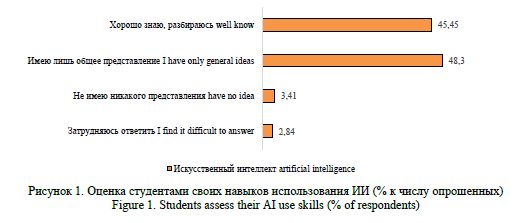
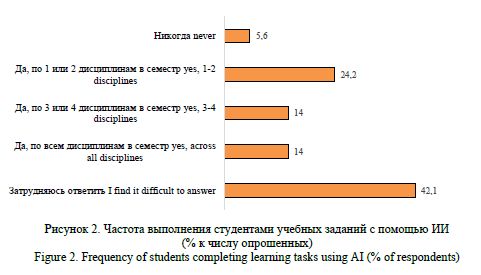
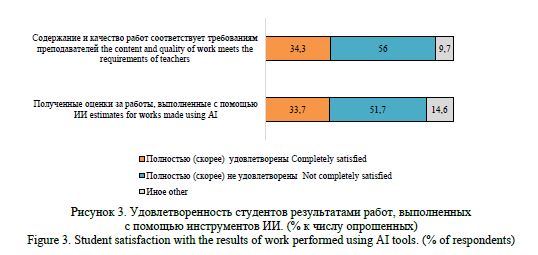
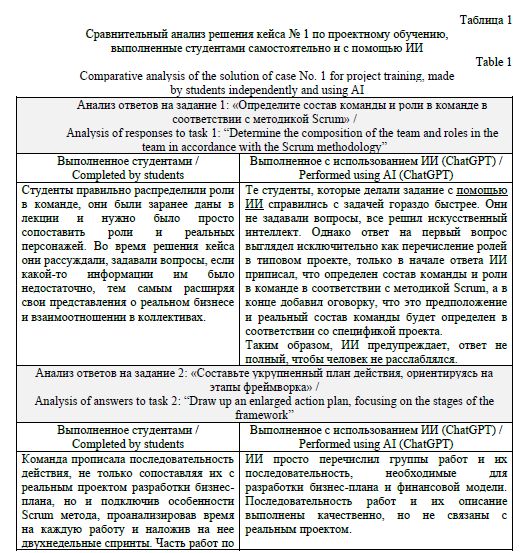
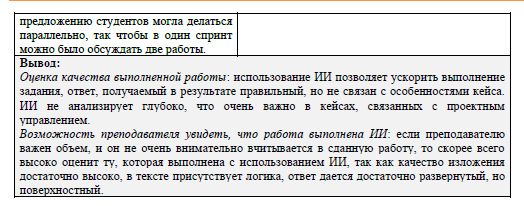
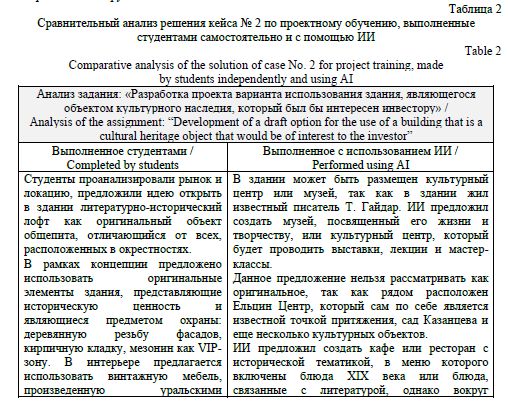
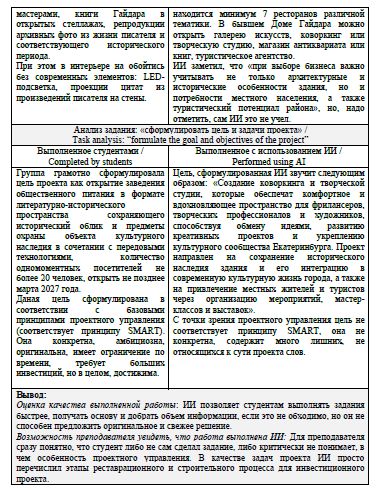
Chevtaeva, N. G., Bobrova, O. V., Makovkina, S. A., Trofimova, O. M. (2025), “Project learning as a resource for building student academic integrity in the Ai Age”, Research Result. Sociology and management, 11 (3), 218-242. DOI: 10.18413/2408-9338-2025-11-3-1-3.


















While nobody left any comments to this publication.
You can be first.
Boronina, L. N., Kulminskaya, A. V., Markina, A. A., Reprinceva, N. E. (2024), “Manifestation of student agency in project training: case of a federal university”, Research Result. Sociology and management, 10 (3), 200-216, DOI: 10.18413/2408-9338-2024-10-3-1-3, EDN: OSXQTQ. (In Russian).
Vyaselev, R. I. (2024), “Specifics of the application of project forms of education in the preparation of communication-oriented students”, Upravlenie obrazovaniem: teoriya i praktika, 14 (4-1), 224-231, DOI: 10.25726/z2142-5882-5775-p, EDN: SYCSGE. (In Russian).
Glukhova, O. Ju., Gudov, A. M., Sirik, S. M. (2024), “Organization of project training in a higher education institution (on the example of Kemerovo State University)”, Razvitie obrazovaniya, 7 (2), 12-20, DOI: 10.31483/r-109452, EDN: RVKOZZ. (In Russian).
Davydov, S. G., Matveeva, N. N., Ademukova, N. V., Vichkanova, A. A.(2024), “Artificial intelligence in Russian higher education: current state and development prospects”, Universitetskoe upravlenie: praktika i analiz, 28(3), 32-44, DOI: 10.15826/umpa.2024.03.023, EDN: FELSPP. (In Russian).
Koksharov, V. A., Hlebnikov, N. A., Sandler, D. G. (2024), “Comparative analysis of organizational models of project training in Russian universities”, Universitetskoe upravlenie: praktika i analiz, 28 (2), 17-28, DOI: 10.15826/umpa.2024.02.012, EDN: LMTQOS. (In Russian).
Nazarov, A. V. (2024), “Methodology for ranking the stakeholders of an educational organization”, Voprosy upravleniya, 2(18), 65-80, EDN: TVENWK. (In Russian).
Pevnaya, M. V., Boronina, L. N., Kulminskaya, A. V. (2024), “Topical issues of the implementation of project training in higher education (based on the materials of the round table”, Vysshee obrazovanie v Rossii, 33 (12), 142-154, DOI: 10.31992/0869-3617-2024-33-12-142-154, EDN: DYRMKJ. (In Russian).
Simonova, A. A., Davydova, N. N. (2024), “The role of scientific and educational collaboration in the formation of the readiness of pedagogical teams for innovation”, Voprosy upravleniya, 6 (18), 60-73, DOI: 10.22394/2304-3385-2024-6-60-73, EDN: DBTLVE. (In Russian).
Sysoev, P. V. (2023), “Artificial intelligence in education: awareness, readiness and practice of using artificial intelligence technologies by teachers of higher education in professional activities”, Vysshee obrazovanie v Rossii, 32 (10), 9-33, DOI: 10.31992/0869-3617-2023-32-10-9-33, EDN: TZYTKM. (In Russian).
Sysoev, P. V. (2024), “Ethics and AI plagiarism in the academic environment: students' understanding of the observance of author's ethics and the problem of plagiarism in the process of interaction with generative artificial intelligence”, Vysshee obrazovanie v Rossii, 33 (2), 31-53, DOI: 10.31992/0869-3617-2024-33-2-31-53, EDN: VTAIUO. (In Russian).
Husnutdinov, A. N. (2024), “AI in education is the revolutionary future of learning”, Ekonomika i upravlenie: problemy, resheniya, 5 (7), 127-133, DOI: 10.36871/ek.up.p.r.2024.07.05.015, EDN: CNCZOI. (In Russian).
Chevtaeva, N. G., Bobrova, O. V., Kol,l E. (2024), “Academic integrity in the structure of a student's stable anti-corruption position: experience in sociological analysis”, Obrazovanie i nauka, 26 (10), 131-165. DOI: 10.17853/1994-5639-2024-10-131-165, EDN: VHJCSF. (In Russian).
Chevtaeva, N. G., Nikitina, A.S., Vishnevskaya, A. V. (2020), “The culture of communication between a teacher and a student as a matrix for the formation of a “soft skills” graduate”, Vysshee obrazovanie v Rossii, 29 (12), 33-44, DOI: 10.31992/0869-3617-2020-29-12-33-44, EDN: HVSPLG. (In Russian).
Shmeleva, E. D., Semenova, T. V. (2019), “Academic fraud students learning motivation vs educational environment”, Voprosy obrazovaniya, (3), 101-129, DOI: 10.17323/1814-9545-2019-3-101-129, EDN: DRSCII. (In Russian).
Adam, L., Anderson, V. & Spronken-Smith, R. (2017,) “‘It’s not fair’: Policy discourses and students’ understandings of plagiarism in a New Zealand university”, Higher Education, 74 (1), 17-32, DOI: 10.1007/s10734-016-0025-9, EDN: EROASK.
AlZu'bi, S., Mughaid, A., Quiam, F. & Hendawi, S. (2023), “Exploring the Capabilities and Limitations of ChatGPT and Alternative Big Language Models”, Artificial Intelligence and Applications, 2 (1), 28-37.
Amiri, F. & Razmjoo, S. (2016), “On iranian EFL undergraduate students’ perceptions of plagiarism”, Journal of Academic Ethics, 14 (2), 115-131.
Cebrián-Robles, V., Raposo-Rivas, M. & Sarmiento-Campos, J. A. (2016), “Ética o prácticas deshonestas? El plagio en las titulaciones de educación”, Revista de Educación, 374, 161-186.
Cebrián-Robles, V., Raposo-Rivas, M., Cebrián-de-la-Serna, M. & Sarmiento-Campos, J. A. (2018), “Percepción sobre el plagio académico de estudiantes universitarios españoles”, Educación XX1, 21 (2), 105-129.
Curtis, G. J. & Vardanega, L. (2016), “Is plagiarism changing over time? A 10-year time-lag study with three points of measurement”, Higher Education Research & Development, 35 (6), 1167-1179.
Damian, Okaibedi Eke (2023), “ChatGPT and the rise of generative AI: Threat to academic integrity?”, Journal of Responsible Technology. 13, 100060, DOI: 10.1016/j.jrt.2023.100060, EDN: CDZZMF.
Denisova-Schmidt, E. (2023), “Academic Dishonesty at Russian Universities: A Historical Overview”, Universe of Russia. Sociology. Ethnology, 32 (1), 159-181, DOI: 10.17323/1811-038X-2023-32-1-159-181, EDN: TWCKOM.
Di Paulo, D. (2022), “Do preservice teachers cheat in college, too? A quantitative study of academic integrity among preservice teachers”, International Journal for Educational Integrity, 18 (2), DOI: 10.1007/s40979-021-00097-3.
Foltynek, T., Bjelobaba, S., Glendinning, I. et al. (2023), “ENAI Recommendations on the ethical use of Artificial Intelligence in Education”, International Journal for Educational Integrity, 19(12), DOI: 10.1007/s40979-023-00133-4.
Groumpos, P. P. (2023), “A Critical Historic Overview of Artificial Intelligence: Issues, Challenges, Opportunities, and Threats”, Artificial Intelligence and Applications, 1 (4), 181-197.
Kocoń, J., Cichecki, I., Kaszyca, O., Kochanek, M., Szydło, D., Baran J. & Kazienko P. (2023), “ChatGPT: Yack of all trades, master of none”, Information Fusion, (99), 101861, DOI: 10.1016/j.inffus.2023.101861, EDN: SDMKSA.
Madauss, BJ. (2025), “Project Management Implementation”, Project Management, Springer, Berlin, Heidelberg, 561-595, DOI: 10.1007/978-3-662-69057-4_17.
Javaid, M., Haleem, A., Pratap Singh, R., Khan, Sh., Khan, I. H. (2013), “Unlocking the opportunities through ChatGPT Tool towards ameliorating the education system”, BenchCouncil Transactions on Benchmarks, Standards and Evaluations, (3), 100115.
Masum, M. R., Training, T. (2024), “Systems Engineering and Project Management with AI Training by Tonex”, Conference: Systems Engineering and Project Management with AI October 2024, DOI: 10.13140/РГ.2.2.11797.95205.
Rospigliosi, P. A. (2023), “Artificial intelligence in teaching and learning: what questions should we ask of ChatGPT?”, Interactive Learning Environments, 31 (1), 1-3, DOI: 10.1080/10494820.2023.2180191, EDN: XLMMYJ.
Shahriar, S., & Hayawi, K. (2023), “Let’s Have a Chat! A Conversation with ChatGPT: Technology, Applications, and Limitations”, Artificial Intelligence and Applications, 2 (1),
11-20, DOI: 10.1080/10494820.2023.2180191, EDN: XLMMYJ.
Sims, R. L. (1993), “The relationship between academic dishonesty and unethical business practices”, Journal of Education for Business, 68 (4), 207-211.